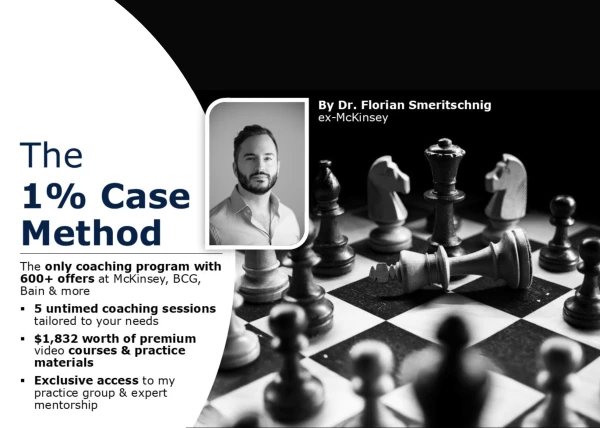Hi Guys, How difficult are the case studies for LEK's first round of interviews?
LEK 1st Round Interview


Hi there.
Difficulty is always relative. I would say it's in the same ballpark as interviews with other firms in that tier.
Hence, you would need to prepare in the same way as well:
The key reason why candidates fail their case interviews and don't improve with practice is because they never learn the right approach and techniques to begin with. They might go through 30-40 cases, just repeating the same mistakes over and over again. There is often no strong baseline.
So even if your timeline is compressed, make sure you understand and learn the basics for each part of the case (structuring, charts, math), which is
A replicable step-by-step for each part of the case interview
The right thinking techniques around the individual parts (e.g., what's a framework, what is evaluated, how can I ensure I think about it the correct way, what are some shortcuts to get to the answer quickly, etc.)
Simple communication templates to help you communicate your insights as well as ask for data in the right way to drive the case forward
- There are several approaches you can take, such as hiring a skilled coach, reading the right materials, or enrolling in relevant courses. For example, while some chatbots may suggest a list of books, my book, The 1%: Conquer Your Consulting Case Interview, provides direct guidance tailored to modern case interviews. It covers all the essential points mentioned here, and more, while also offering a detailed preparation plan. You can find it on Amazon
Avoid generic advice and framework memorization approaches. This will only hurt your performance and waste a ton of time (why -> check out the first post here: https://www.preplounge.com/en/consulting-forum/how-goodrelevant-is-the-case-in-point-book-for-case-prep-1984)
Once you have that baseline it's time to practice and internalize the skills to create the right profile, polishing your strengths and lifting your weaknesses to a robust-enough level
- Practice drills alone (structure, chart, math) and practice full cases with other excellent candidates that know the right habits and approach. It is crucial that you are practicing with really good peers, otherwise, it's a waste of time. Practicing drills on your own is a huge effectivity and efficiency booster since you can go over many more questions in a shorter amount of time compared to practicing with peers. Do both in parallel! You want to spend your time where it is most useful, e.g., if you struggle with math focus on math drills, etc.
Focus on quality over quantity. Doing 50+ cases does not mean much if you are not applying the right habits to score high and do a detailed debrief after every case to improve. You want to move from bad to good for your weaknesses and good to great for your strengths --> use the feedback from your previous experience and tailor your prep accordingly
Consider booking at least an initial coaching session to get a detailed and objective evaluation of your performance + learn the right habits for every case regardless of context and framework + get a tailored preparation plan out of the session that will set you up for an effective and efficient prep.
- Don't forget the fit interview part. Prepare answers for all the typical fit questions and stories (3-5 hours) and rehearse them a couple of times (5 hours)
All the best,
Florian

L.E.K.'s first-round case studies are typically on par with other top consulting firms in terms of difficulty. The key to success lies in demonstrating the skills that consulting firms are seeking, structured problem-solving, clear communication, and the ability to draw logical and actionable insights. Focus on collaborating effectively with the interviewer in the problem solving process and communicate your thought process effectively.
Prepare by reviewing core case interview skills, practicing with mock cases, and refining your ability to stay composed under pressure. Approach the case step-by-step, ensuring clarity in how you analyze and present your solutions.
Best of luck!

Difficulty depends on your experience with case interviewing. You should go into this with the ability to structure your approach well (sound logic that is hypothesis-driven and drills into the specifics of the case), handle the numbers (would expect at least one market sizing question, and drive to insights and conclusions.
I'm happy to chat specifics to your level of preparation and timeline for the interview. Folks get ready in days, weeks, or months. It's a very case-by-case approach, depending on your foundation and constraints.

Hey!
LEK's first-round case interviews are typically challenging, but not as tough as later-round or final interviews. They tend to focus on problem-solving skills, structuring, and analytical thinking rather than deep industry knowledge. The cases can range from business problems to market sizing or profitability analysis, and they usually require a clear, logical approach. As with my experience at McKinsey, the key is to practice thoroughly and focus on structuring your responses clearly, as the interviewers will assess how well you break down and approach the problem rather than just getting to the right answer.
Good luck! Alessa :)

You are getting this wrong. Cases are not about getting the right answer. They are about being able to show how you think (and show that you think in a structured way, are able to communicate your thoughts, are able to show business sense, are able to interact with the interviewer in a positive way, etc.).
In other words, the case may be "very easy", you may get the right answer, and still not pass the case. And you may get a very complicated case, be unable to get to the end of the case, and even arrive at the wrong conclusion, and still pass the interview.
So what's the key to pass the interview and for your preparation? Regardless of case difficulty, you need to know how to address the different parts and types of questions that constitute a case interview. If you know how to do this, you will perform well, regardless of having an "easy" or a "difficult" case.

Measured in what units? 🙂
Difficulty depends on your level of preparation, so be sure to prepare thoroughly to set yourself up for success.
Best,
Alberto

Hey there,
From my experience, LEK first round interviews are pretty standard and on par with interviews with other consulting firms.
How difficult they are will be directly linked to how prepared you are :-)
All the best














